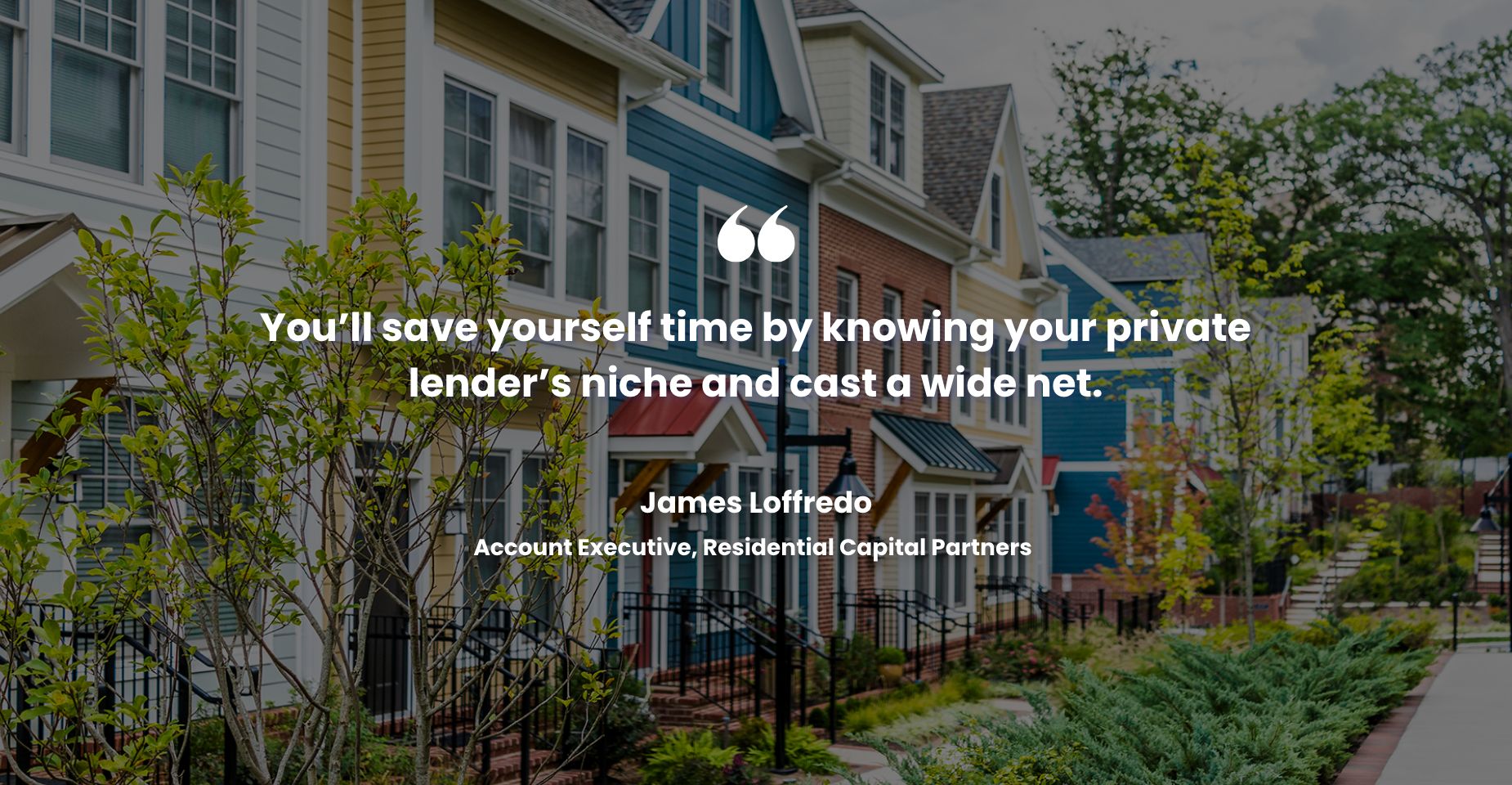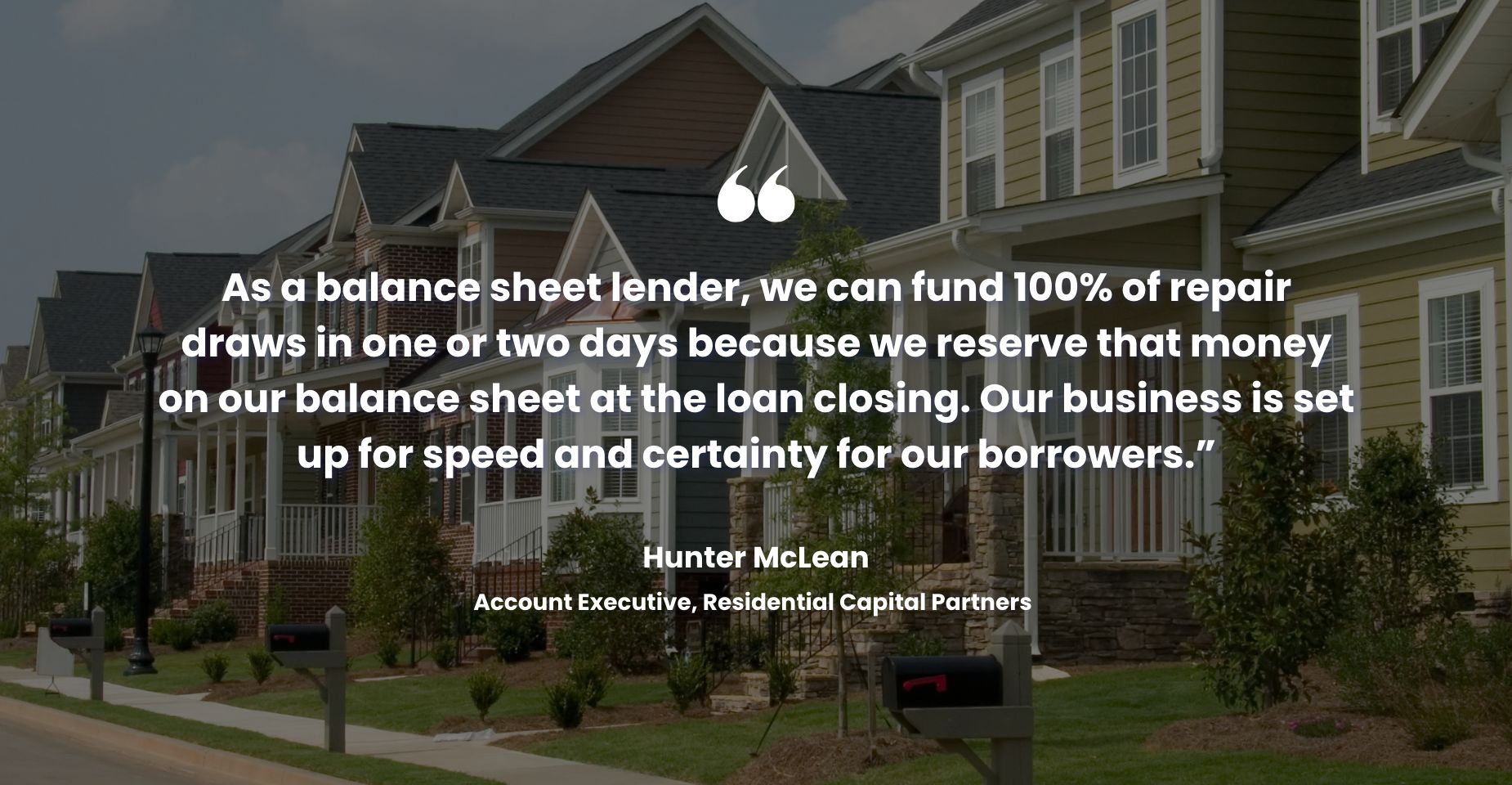
CNBC’s Squawk Box recently reported that through the first eight months of 2023, the real estate investment community turned to private lenders to fund their deals 70% of the time. It’s no secret why single-family real estate investors choose private lenders over traditional banks: speed. The private lending community moves faster than traditional banks and, thanks to their business acumen and experience, is more likely to take mitigated risks during uncertain times.
That said, it is not uncommon for real estate investors to hear “no” from lenders in periods of market volatility. When interest rates are high, lenders—especially those backed by Wall Street—are far more scrupulous of the deals coming across their desk, which can extend their time to approve or deny your loan. The longer it takes for your deal to be approved—the greater the likelihood of the deal falling through. A “no” hurts, but if received in a timely manner, still leaves you with time to find financing elsewhere. A “slow no” can be death by a thousand cuts, evaporating the time you need to find a financing solution.
What’s an investor to do? Here are a few practices single-family real estate investors can employ to circumvent a “slow no” from private lenders, as told from three of Residential Capital Partners’ account executives, James Loffredo, Kyle Dreyer, and Hunter McLean.
Organize Your Paperwork
Paperwork is undeniably the least exciting part of a rehab—but it’s also the backbone of the lending process. Whether you’re applying for credit or for a specific deal, two aspects of your paperwork have a drastic impact on your answer: accuracy and speed. “Get in everything as quickly as you can,” says Dreyer, “If we have the information we need, we can honor you with an answer in two days or less.”
The details matter for submissions, too.
Loffredo reports, “There’s a misconception that private lenders don’t have the same standards as big banks for what we call a complete file. While there are fewer hoops to jump through, we take every application seriously and require certain standards.”
“Sometimes,” McLean adds, “We’ll get what looks like a complete file but there’s a piece that’s not quite right—for example, proof the borrower filed for a tax return, but not the actual document.”
How to Streamline Your Paperwork Process
- Compile all necessary documents:
This includes credit reports, asset verifications, property appraisals, business plans, and more. A complete package shows professionalism and can expedite the process. - Review and double-check:
Carefully review each document to ensure accuracy. Mistakes or inconsistencies can lead to delays. - Keep everything accessible:
Use digital tools or a well-organized filing system to ensure that any document can be quickly retrieved if the lender has questions or needs additional information.
Work With a Balance Sheet Lender
Real estate investors are far more likely to get a “no” from traditional banks and private lenders funded by Wall Street during volatile markets. For every deal, these lenders require ample documentation to show their bank proof the deal will be profitable.
Meanwhile, balance sheet lenders like Residential Capital Partners lend money that is under their discretion and control. You’re never more than one person away from the source of capital. Balance sheet lenders still require documentation but prioritize relationships and trust as well.
This expedites every part of the lending process, from application approval to repair draws. McLean reports, “As a balance sheet lender, we can fund 100% of repair draws in one or two days because we reserve the money on our balance sheet at the loan closing. Our business is set up for speed and certainty for our borrowers. Other lenders have to secure the money, then send an inspector to verify the borrower did the work. With us, you send us photos of the work, and we wire the money to your account.”
Benefits of a Balance Sheet Lender
- Faster Decisions:
With fewer bureaucratic hurdles, balance sheet lenders often make decisions faster. Their streamlined approach means less overhead, leading to quicker approval or rejection. - Flexibility:
These lenders can be more adaptable in terms of the types of properties they’ll finance. This can be an advantage for house flippers who frequently work with diverse property types. - Personalized Approach:
Balance sheet lenders often prioritize relationships, providing a more personalized experience. This can foster a more intuitive understanding of your needs, leading to a faster decision.

Cast a Wide Net on “Creative” Deals
Generally, the more volatile the market, the fewer straightforward deals are on the market. Investors take on more creative deals: properties that require extra square footage or a second story, a single-family home that can be transformed into a duplex, etc.
While there’s nothing wrong with creative deals, it’s important to know your lender, and know whether they will accept this type of deal. “Unfortunately, we get a lot of deals we can’t service, like mobile homes, or ‘full gut’ renovations. Those are simply not our bread and butter. You’ll save yourself time by knowing your private lender’s niche and cast a wide net,” Loffredo offers.
Tips for Creative Deals
- Understand the Lender’s Requirements:
Research various lenders to find those comfortable with creative deals. Understanding what they are looking for in advance can save a significant amount of time. - Try Multiple Lenders:
Don’t put all your eggs in one basket. Casting a wide net and reaching out to multiple lenders who are open to unconventional deals can increase the chances of securing financing quickly. - Showcase Success in Creative Deals:
If you have successfully completed creative deals before, make sure to highlight this experience. Providing evidence of prior success can instill confidence in lenders.
Set Yourself Up for a Fast Yes
In single-family rehab and rental transactions, a slow no from a lender is more than just a rejection—it’s a barrier to progress that can cost valuable time and money. By organizing paperwork meticulously, working with balance sheet lenders, and casting a wide net on creative deals, you can secure the funding you need more efficiently.
These strategies aren’t merely about avoiding rejection; they’re about building a more responsive and robust approach to financing. In the high-stakes world of real estate investment, a faster yes or no can make all the difference in seizing an opportunity or watching it slip away.





